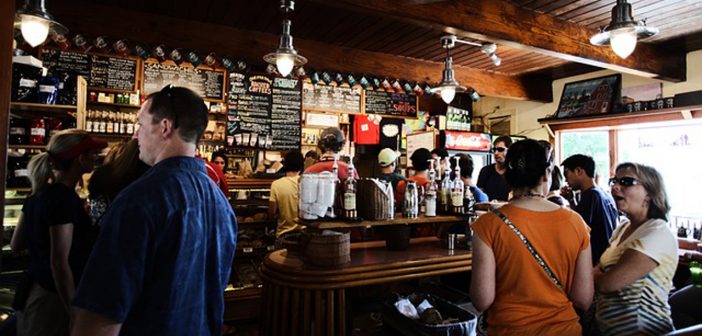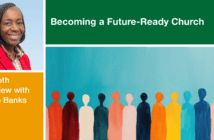Scott Chrostek, pastor of Resurrection Downtown, visited thirty-three coffee shops during his first month in Kansas City with a daily goal of having thirty-five conversations that led to discussion of his church. He says these encounters were often “holy surprises,” even when his conversation partners were seemingly uninterested in church. Scott shares strategies for maximizing the opportunity to meet neighbors in coffee shops or other local establishments.
Coffee shops are sought-after gathering spaces. They are the places where locals hang out in the hopes of connecting with one another. The people who go to coffee shops are almost always people looking for a connection. You’ll see people tirelessly working on their laptops, even on weekends. Why are they there? I believe it is largely to avoid the deafening silence and isolation of working from home. In coffee shops you will find lots of people reading books, not necessarily because it’s the place to get quality reading done. But the coffee shop provides them with a place to be seen, to be social, to build community, and find life — maybe even life with a new friend who enjoys the same author or the same kinds of books.
My coffee shop conversations were holy surprises largely because most people aren’t willing or looking to have conversations with strangers, and most pastors aren’t willing to engage people where they are and as they are.
Thirty-five Pennies
During my first thirty-one days in Kansas City, I went to thirty-three coffee shops, and I set a numerical goal for each visit. My goal was to bump into, meet, and invite thirty-five people a day to join me in building Christian community in downtown Kansas City. As a way of holding myself accountable, I placed thirty-five pennies in the front right pocket of my pants. For each conversation that led to the church, I moved a single penny from my right pocket to my left. My practice was to not return home until all thirty-five pennies made it into my left pocket.
These conversations began with small talk and then transitioned into a conversation that eventually pointed toward church. I would ask questions pertaining to that particular stranger’s occupation or vocation, hoping that, if asked, the question would be reciprocated so that I could have an opportunity to share the details of what I was doing in Kansas City. Once a conversation had fully transitioned to the point that I shared the story of Resurrection Downtown and exchanged my business card with the other person, I would then move the penny from my right pocket to the left pocket.
Strategies for Maximizing Coffee Shop Conversations
As I set out to bump into my neighbors and meet them where they were, it got to the point that I needed a plan for when and where these conversations would take place. Here are some of the strategies I focused on to maximize opportunities for conversation. Incidentally, all of this also translated to small diners, local watering holes, wherever you find God placing you.
- Wait to enter the coffee shop until a line has formed.
- Get in line (and never cut in line, as that will initiate a conversation with a different tenor).
- Initiate conversation with the person standing in front of you in line.
- Next, engage the barista in conversation at the counter while ordering coffee.
- Always order a drink that requires time and preparation (Americanos are best if you like black coffee and are on a budget.)
- Introduce yourself to the barista and talk long enough until the person behind you in line steps up to order.
- Introduce that person (the one behind you in line) to the barista you just met and to yourself.
- While waiting for your Americano, talk to the person behind you in line, and ask about their drink.
- Before leaving, take fifteen minutes to sit and survey the coffee shop. Look for people reading familiar books, sitting by themselves, or typing by themselves, and sit near them.
I would talk to an average of three to five people about our new church in every coffee shop I entered. About half of my conversations went really well. After telling people that I was a new pastor of a new church, some would engage me with all sorts of exciting questions. They would want to know about our vision, our purpose, or our mission. They would ask me about service opportunities and worship times.
Holy Surprises
Admittedly, though, not everybody enjoyed meeting the new pastor in town. About half of the conversations I entered into weren’t at all well received. Some were very awkward. These people would generally tell me about how they used to go to church when they were in third grade, or how they didn’t believe in God at all, or that they simply weren’t interested. It would have been easy to get discouraged by those conversations, and at times I was.
However, what I noticed over time was that even when conversations didn’t go well, the simple act of having a conversation with a pastor at a coffee shop was enough to leave a lasting impact. As I later found out, sometimes these disinterested people would go on to talk with a friend, a spouse, or a co-worker later in the day. And that would elicit some response like, “Since when are you the type of person who would have coffee with a pastor?” And usually, in a matter of moments, the person who didn’t like me at first was now on my team, defending our conversation. Over the course of the past five years, there have been several instances where people were excited about sharing with their friends and family that they had a conversation with me, largely because this kind of activity was a surprising interruption into their everyday routine.
My coffee shop conversations were holy surprises largely because most people aren’t willing or looking to have conversations with strangers, and most pastors aren’t willing to engage people where they are and as they are. All of this combined made my coffee shop experiences even better because, in time, I couldn’t go anywhere without bumping into someone who remembered me or who had heard a reference to me. In fact, most people were actually excited to see me or excited that I remembered them when we bumped into each other a second or third time. What would happen if we continued reaching out like this with the love of Christ everywhere we go?
This article is adapted from Scott Chrostek’s book, The Misfit Mission: How to Change the World with Surprises, Interruptions, and all the Wrong People (Abingdon, 2016) and used by permission. The book is available through Cokesbury or Amazon.






